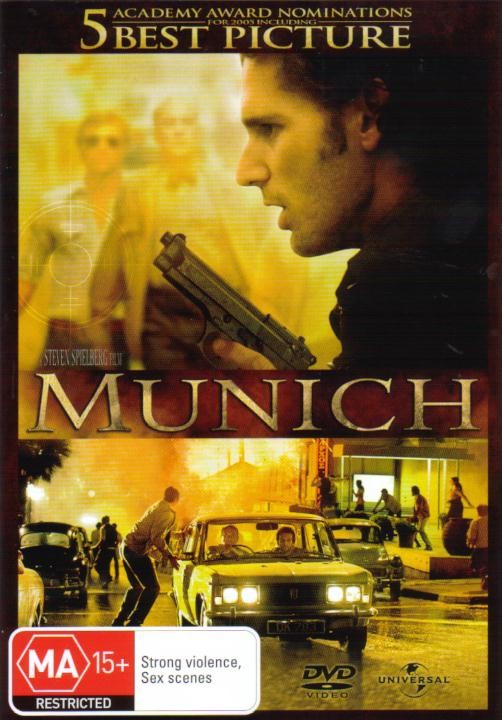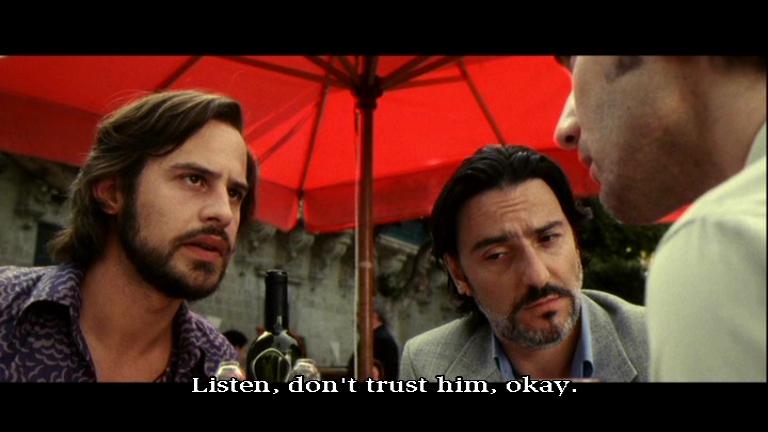Munich (2005) |
|
Munich (2005) |
|


|
| BUY IT |
| General | Extras | ||
| Category | Drama |
Main Menu Animation Featurette-Optional Introduction By Steven Spielberg Featurette-Munich: The Mission, The Team |
|
| Rating |

|
||
| Year Of Production | 2005 | ||
| Running Time | 157:05 | ||
| RSDL / Flipper | RSDL (114:11) | Cast & Crew | |
| Start Up | Language Select Then Ads Then Menu | ||
| Region Coding | 2,4,5 | Directed By | Steven Spielberg |
|
Studio
Distributor |
Dreamworks Universal Pictures Home Video |
Starring |
Eric Bana Daniel Craig Ciarán Hinds Mathieu Kassovitz Hanns Zischler Ayelet Zurer Geoffrey Rush Gila Almagor Michael Lonsdale Mathieu Amalric Moritz Bleibtreu Valeria Bruni Tedeschi Meret Becker |
| Case | Amaray-Opaque | ||
| RPI | $39.95 | Music | John Williams |
| Video | Audio | ||
| Pan & Scan/Full Frame | None |
English Dolby Digital 5.1 (384Kb/s) English Descriptive Audio Dolby Digital 2.0 (192Kb/s) |
|
| Widescreen Aspect Ratio | 2.35:1 | ||
| 16x9 Enhancement |
 |
||
| Video Format | 576i (PAL) | ||
| Original Aspect Ratio | 2.35:1 | Miscellaneous | |
| Jacket Pictures | No | ||
| Subtitles |
English for the Hearing Impaired Arabic Icelandic |
Smoking | Yes |
| Annoying Product Placement | No | ||
| Action In or After Credits | No | ||
Steven Spielberg's Munich (2005) is one of the most important films of our modern times. Munich (2005) not only marks a mature and uncompromising approach towards filmmaking for the master director but is also indicative of the re-emergence of the political thriller genre. Similar to George Clooney's Good Night, and Good Luck (2005), both films look to the past in order to revaluate modern anxieties in our current unpredictable political climate. Unfortunately Munich (2005) was ignored during the 2005/2006 award season as it was overshadowed by the phenomenon that was Brokeback Mountain (2005).
During the production of Munich (2005), which began filming in June 2005 and was theatrically released in late December of that year, there were concerns of Spielberg hurrying the film during post-production in order to make the award season's Christmas deadline. Furthermore, the production itself was plagued with rumours as the Maltese, Budapest, New York and Paris film sets were off limits for the media. It was also reported few actors were able to view the finished script by Tony Kushner and Eric Roth and Spielberg refused to do any further publicity for the film besides an exclusive interview for TIME magazine (December 2005) in which the director noted his true motivation, which is that Munich (2005) "is a prayer for peace." Munich (2005) is also described as a historical fiction by Steven Spielberg. That is to say it is a fictional narrative based on a historical event - by no means is the film to be interpreted as a documentary.
Munich (2005) was released worldwide in cinemas without the usual test screenings and studio executive screenings and with such imposed silence by the dedicated cast and crew many critics instantly thought the film was biased and unfinished; for instance, in response to Spielberg stating Munich (2005) is based on 'Vengeance: The True Story of an Israeli Counter-Terrorist Team' by Canadian journalist George Jonas, Journalist Yossi Melman of the Israeli newspaper Ha'aretz dismissed the same book as fictional and as an unsound evidential source which is "strewn with mistakes." The novel is based on the story of Yuval Aviv who claimed to have once been a Mossad agent. Moreover, Munich (2005) has also been criticised for portraying the sense of duty of killing terrorists with sympathy. The list goes on and on and it seems the concern which is at the heart of Munich (2005) has been ignored by critics and audiences; Munich (2005) debates whether an "eye for an eye, a tooth for a tooth" is justifiable motive for counter-violence.
Munich (2005) is a daring film for Spielberg, particularly as he is a director noted for exploring his inner-child within his films - consequently, he is increasingly underrated as an important American filmmaker within academic circles as he is often alluded to as being only capable of family friendly CGI blockbusters and the rare serious film. Instead, Spielberg should be admired for his ability to successfully transcend genres and allow his characters to be multifaceted. Whether it is an exploration of the loss of innocence, slavery or war, life and death are central to the Spielberg universe, as is the best and worse of humanity and everything in between. Subsequently Munich (2005), his most ambitious film to date, is as quietly explicit as it is visually subtle yet brutal and uniquely merciless.
The film takes place immediately within the midst of the Munich Olympics massacre of 1972 where members of the Israeli Olympic team were taken hostage by the terrorist organisation named Black September. This event is chillingly recreated by Spielberg through actual archival footage and recreations of the infamous scenes including the notorious scene of a balaclava clad member of Black September on the balcony of the Israeli team quarters at the Olympic Village. While this event is not central to the narrative of Munich (2005), the event is instilled within each character and haunts everyone of them in confronting ways. Avner Kaufman (Eric Bana), an Israeli-born office worker for Mossad of German descent watches the events unfold on screen with his pregnant wife like the rest of the world.
Golda Meir, the then Prime Minister of Israel, and the Israeli Defense Committee make a decision secretly authorising Mossad to track down and eliminate those responsible for the Munich massacre. Avner is swiftly summoned to be the leader of a five-member assassination squad to seek revenge by locating and eliminating the planners responsible for the terror attack, aided by the agency's stations in Europe. The death squad is completed with Steve (Daniel Craig) a South African getaway driver, Hans (Hanns Zischler) a German Jew document forger, Robert (Mathieu Kassovitz) a Belgian toy-maker turned bomb expert and Carl (Ciaran Hinds) who is a 'clean-up' specialist. Each member is different in every way possible, from background, age and ethics to religious beliefs, but they are united for one cause and set out to seek vengeance in the most callous of ways. The tension between the characters and within themselves is beautifully conceived; Spielberg offers no easy answers and keeps firm focus on the human response and the conflict between the motivations behind their actions and the consequences.
Everything about Munich (2005) is eloquently conceived; the lead performances by the international cast are outstanding and as this is an ensemble piece there are some pivotal understated roles provided by Ayelet Zurer, Geoffrey Rush, Michael Lonsdale, Mathieu Amalric, Yvan Attal and Gila Almagor which are all equally commendable. At its simplest Munich (2005) is a descendent of the cinema of the late John Frankenheimer, Costa-Gavras and the spy world of John Le Carre. At its most complex; Munich (2005) is a film which asks a lot from its audience as it presents many questions with no answers. What is most certain is Munich (2005) is blatant in showing our post 9/11 society through past notorieties and explores our issues of grief and guilt in the medium of historically-based fictional cinema. Munich (2005) is a confronting yet significant film which needs to be viewed and discussed, as Spielberg has created an intelligent espionage thriller which is also representative of our trauma-affected society, the repercussions of vengeance and the fragility of life.
The transfer is of superb quality and is flawless; it is presented in an aspect ratio of 2.35:1 and is 16x9 enhanced. Cinematographer Janusz Kaminski has visualized the unchanging cities of Europe with detail and photographed a world reminiscent of the espionage thrillers of the 1970s. The grain and muted colours are an artistic choice and have been rendered very well in this PAL release. The hand-held sequences are also replicated well as the image remains sharp and focused. There is no evident colour bleeding and no MPEG compression artefacting. The transfer has been encoded at an average bitrate of 5.78 Mbps and optional subtitles remain true to the onscreen dialogue. The layer change is evident but only offers the slightest of pauses at 114:11 between scenes.
The one criticism I have is that the transfer, like most Region 4 titles, does not have the original subtitles on the print and instead pivotal dialogue and the end summary of the film appear as a forced subtitle stream which is not in a particularly clear font and which appears low on the image and takes away from the pleasure of viewing the film. Here is an example:
 |
| Sharpness | |
| Shadow Detail | |
| Colour | |
| Grain/Pixelization | |
| Film-To-Video Artefacts | |
| Film Artefacts | |
| Overall |
While a DTS track would have been the most pleasing of options it would have most certainly lowered the image quality so in this case the Dolby Digital 5.1 soundtrack is more than adequate. Like the image quality this audio option is faultless and remains encompassing and clear. As the film is a thriller, tension is created through the sound and Ben Burtt and the sound department excel in creating unease with precision, creating a subtle and yet volatile environment. The dialogue is clear and audible and equally remains subtle. Subsequently John Williams’ followed suit with an expressive but restrained score which builds slowly to an emotional climax.
A Descriptive Video Service audio track is also an audio option. It is presented as a Dolby Digital 2.0 soundtrack and consists of a female voice describing key scenes between dialogue to aid audiences who are blind or visually impaired. It is located under bonus features.
| Dialogue | |
| Audio Sync | |
| Clicks/Pops/Dropouts | |
| Surround Channel Use | |
| Subwoofer | |
| Overall |
The menu design is well themed to the film. It features an image of a key scene in the film and is subtly animated.
The introduction can be viewed preceding the film as a viewing option. The 4:36 segment initially consists of Spielberg speaking over behind the scenes footage, scenes of the film and towards the end we see the proper interview footage from which the voice-over is sourced. The director speaks of his motivation and his interest in the story, states his intentions regarding what he hopes the film will achieve and notes the film is not a documentary but is derived from factual history. It is very helpful to view this either before or after viewing the film. It contains no spoilers but rather exists as an artist's statement. It is a nice addition in lieu of a director's commentary, which is something Spielberg has yet to contribute to his film's DVD releases as he prefers traditional interviews over DVD commentaries.
This feature consists of interviews from the key cast and crew speaking of the international production and their motivations. Although it is relatively short at 13:30, the interviews do shed some light on the complex narrative and how Spielberg cast the film. It is a nice addition to an otherwise bare-bones disc.
NOTE: To view non-R4 releases, your equipment needs to be multi-zone compatible and usually also NTSC compatible.
The Region 1 Collector's Edition is the clear winner but as it was a limited edition it is most likely unavailable to purchase online. It also had the better thematic cover art.
In regards to the Region 1 NTSC 1 DISC Edition and the Region 4 PAL 1 DISC Edition:
The R1 misses out on:The R4 misses out on:
| Video | |
| Audio | |
| Extras | |
| Plot | |
| Overall |
| Review Equipment | |
| DVD | Denon DVD-1910, using DVI output |
| Display | Panasonic PT-AE 700. Calibrated with THX Optimizer. This display device is 16x9 capable. This display device has a maximum native resolution of 1080p. |
| Audio Decoder | Built in to amplifier/receiver. Calibrated with THX Optimizer. |
| Amplification | Yamaha DSP-A595a - 5.1 DTS |
| Speakers | (Front) DB Dynamics Polaris AC688F loudspeakers,(Centre) DB Dynamics Polaris Mk3 Model CC030,(Rear) Polaris Mk3 Model SSD425,(Subwoofer) Jensen JPS12 |